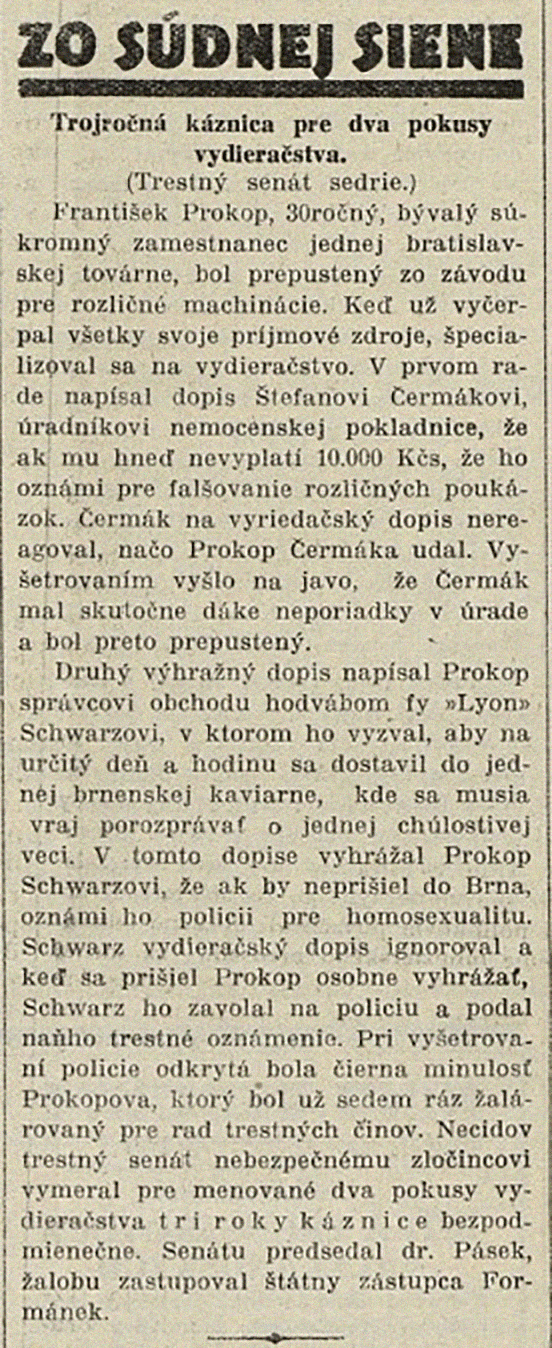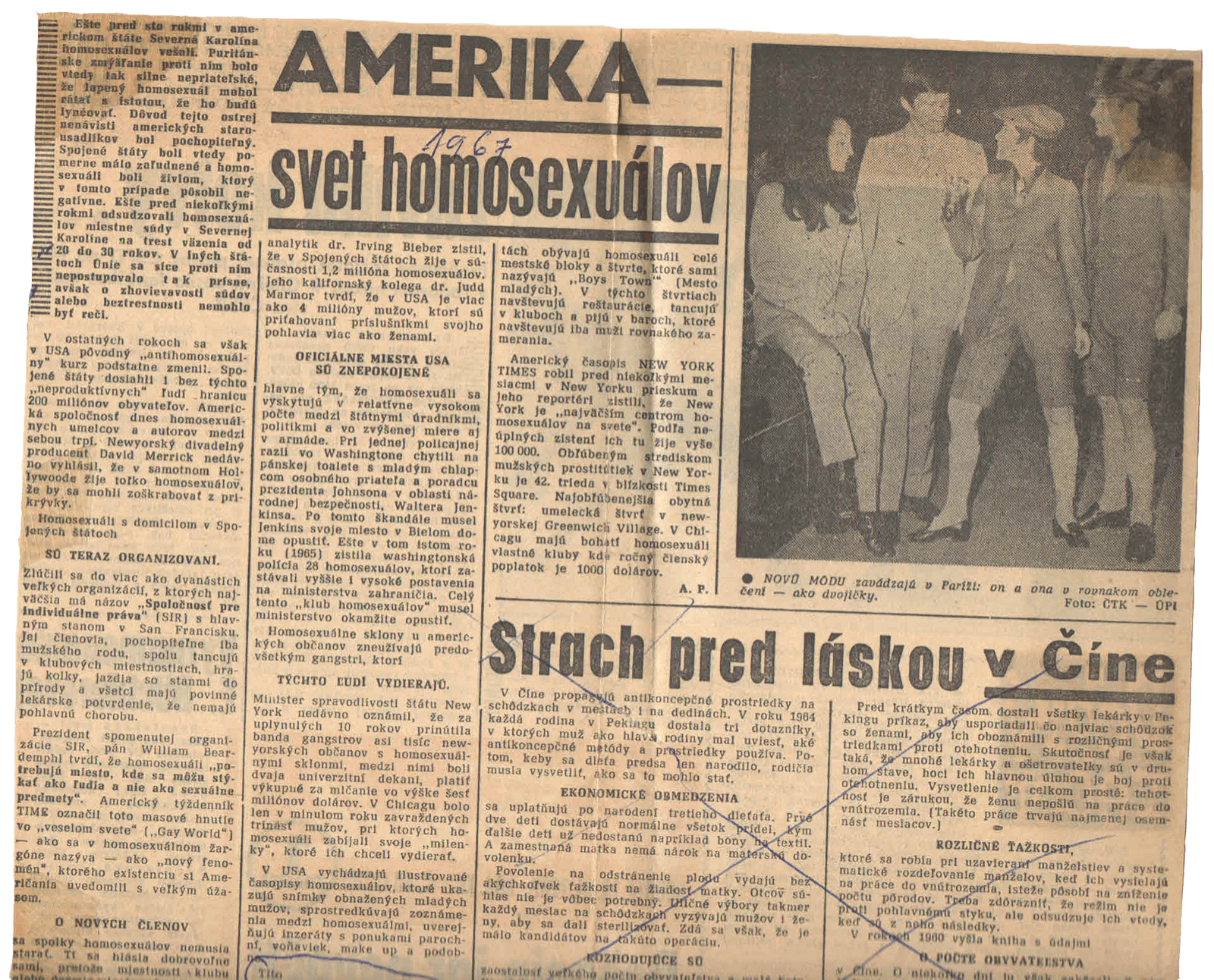In the past, lawyers and public authorities advocated for the decriminalisation of homosexuality - not from a humanist or human rights perspective, but with regard to the abuse of legal instruments. In the interwar period, the press published a number of articles about people becoming victims of extortion groups of young people who specialized in searching for homosexual victims, whom they then extorted and blackmailed financially. The young men threatened their victims, and also threatened to reveal the victim's true sexual identity. If the victim wanted to defend themselves, they threatened them with physical attacks, which often took place. The victims usually did not seek help, and some preferred to pay for fear of disclosure (this sometimes meant that they had to steal money). Others took their own life.



Police raids against pseudo-homosexuals
A special group of detectives protects people with unnatural inclinations from blackmailers and criminals – The curse of being a war prisoner – Young offenders hunt for sick men.
A few months ago, the State Police of Budapest, at the initiative of Chief Detective dr. Lajos Laky, set up a special team of detectives to protect those unfortunate who have sick inclination. The head of the team is tactful and adept police inspector Ernő Róna, who with his team of four observes the suspicious elements lurking around people with sick inclinations. The team conducts regular raids in places in Budapest where the sick turn up. Based on these raids, the group has already had some surprising experiences. There must be around a thousand men in the capital who betray their affinity with their appearance: they dress very elegantly, shave thoroughly, use powder and always promenade in certain places, where they also meet others. During the war there were still only few of them, usually meeting around the terminus of tram number 8, in the shadows of the Danube bank. Later the so-called Emke Corner, the corner of Rákóczi Street and Erzsébet Boulevard, became their meeting point. Recently men of higher social standing have been spotted in Erzsébet Square, on the Fürdő Street side; the poorer ones walk around in the Népliget park and in the City Park around the circuses. No matter how poor they are, these men always use many cosmetics, which makes them look almost like women, wear prim ties and white gaiters.
Fake passion
In the experience of the police, the number of men with sick inclination has grown especially since the war, and we can conclude that they usually brought this fatal weakness from war prison and internment camps abroad. A surprising number of them work in trading professions. The police have also observed that as a result of this phenomenon of almost epidemic proportions, a new group of criminals was formed in Budapest: people who evilly exploit the weakness of sick men, pretend to be homosexuals and torture and blackmail their poor victims, making them virtually support their living and sometimes they even commit the gravest crimes. Namely, men with sick inclinations are usually shy, and in order to avoid scandal, they decline to go to the police, which makes them free prey to unscrupulous criminals. Therefore, the police keep a register, for the protection of the victims, of men whom pseudo-homosexuals regularly plunder. The photos of potential victims are collected in an album, along with their names and data about lifestyle; this preventive measure can help the police in case a crime is committed against these sick people. Then the police can immediately trace the person’s contact and get on the right track to identify the perpetrator. Such traces were found in the memorable murder case when foreign ministry official Pollák was killed by a young man who, though himself healthy, befriended the sick man, then murdered and robbed him. The police have established that the sick never commit crimes against each other, they always fall victims to those who exploit their sick inclinations.
The 12-year-old blackmailer
Frequently men, especially of a young age, lure their victim to a secluded
place, there they whistle to their companions and together they take the
money and watch from their victim, robbing him completely. During the last raid in the City Park, a whole group of young men was traced
by the detectives, and they also witnessed scenes which proved the rationale
of the raids. Namely, they encountered a young man who was chased by eight
under-age youngsters and was desperately crying for help. It transpired that
one of the youths, aged 12 or 13, had made a plan with his companions, went
to the young man to ask for a cigarette and a movie theater ticket, then
collected his companions in a shady part of the park and they tried to
blackmail the young man. The detectives collected the youngsters, as in their
experience these often turn into dangerous pseudo-homosexuals, who
attempt blackmailing sick people already at such a young age. Another sick
man also reported to Chief Inspector Róna that he was being chased by
several people.
“I am not a doctor”, the Chief Inspector said, ”but a policeman; I cannot cure your problem, but we try to protect you from blackmailers and frauds. However, if you are sick, it is your duty to get yourself cured, hide away from the world, not make a public scandal and especially not initiate contacts with children.”An elegantly dressed young man with a small black English moustache also turned to the Chief Inspector. “I have a complaint, I have already submitted my photo to the police, but the naughty children keep chasing me whenever I set foot in the street. Recently I was walking with my companion and another gentleman, and my companion did not dare to confront the children chasing us, because he was embarrassed in front of the other gentleman.” 15–20 men were arrested during the raid, and interestingly almost all of them are shop assistants. The first question of the experienced detectives was whether the man had been in a prison camp; the answer is usually yes. Now the police is trying to ensure that such former war prisoners and interns should not be able to contact young boys, who on the one hand blackmail and plunder them, on the other hand may also fall victim and increase the number of these unfortunate ones.

.png)

